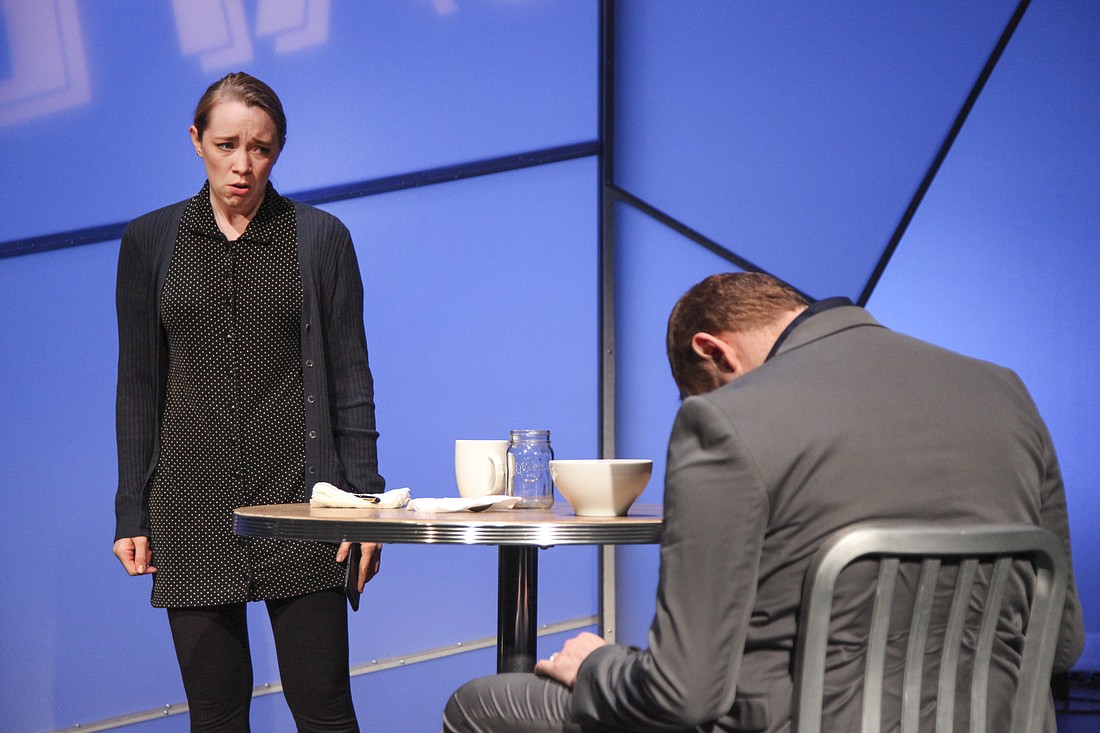- April 11, 2025
-
-
Loading

Loading

Sarah Ruhl’s “Dead Man’s Cell Phone” is on speed dial for the theater of the absurd in this month’s FSU/ Asolo Conservatory production.
The setting: present day, more less. A man in a generic café won’t answer his cellphone. He just sits there. His phone keeps ringing. A young woman named Jean (Anna Beth Baker) at a nearby table gets frustrated. Is he dead or what? As a matter of fact, he is dead.
After dialing 911, Jean takes the dead man’s cellphone and answers his calls. Her journey down the rabbit hole begins.
After discovering the man’s name was Gordon (Chris Hayhurst), Jean tracks his circle of callers down. Pretending to be his business colleague, Jean earns their confidence with well-intentioned lies — obvious lies. She doesn’t even know what business Gordon was in. Even so, that tactic gets Jean close to Mrs. Gottleib (Bonita Jackson), the dead man’s imperious mother; Hermia (Jamie Saunders), his high-maintenance wife; his
domineering mistress (Kaitlyn Weickel), and Dwight (Jacob Sefcak), his soft-spoken brother. They’re all stupid enough to trust her. Even so, Gordon’s kind words in Jean’s stories strike them all as out of character. They are.
Jean idealizes the deceased. When he finally makes an appearance from beyond the grave, it turns out he’s an ideal jerk. Gordon’s ill-defined business turns out to be criminal, lethal and cruel. In a “Twilight Zone” episode, Jean’s misplaced faith in this monster could lead her to eternal damnation. But this is a Sarah Ruhl play, so relax.
Ruhl is clearly an Ionesco fan. There’s no plodding plotting. The action flows seamlessly from a ridiculous premise: What if that rude idiot who won’t answer his phone is actually dead? (I figure an annoying cellphone ruined Ruhl’s lunch one day.) It’s always hilarious, and never realistic.
Peter Amster’s direction honors Ruhl’s hall-of-mirrors sensibility. He lets the mad dream unfold in a matter-of-fact style. Amster never elbows you in the ribs, or calls attention to the mad logic. And so the comedy works.
Baker’s Jean is a naïf in the tradition of “Candide” and “Alice in Wonderland.” Her character’s a goodhearted soul without a grain of common sense, and you love her for it.
Gordon’s painfully shy brother works in a stationery store. In Sefcak’s portrayal, Dwight might as well be made out of paper. He’s fragile—and probably the most human character in the play, aside from Jean. Dwight’s artistic sensitivity makes him vulnerable to thugs like his brother. As to the eponymous
stiff, Hayhurst’s Gordon is a model of sociopathic narcissism. He worships the holy trinity of Me, Myself and I, and nothing can shake that faith. Gordon’s mother worships him, too, for unfathomable reasons. In Jackson’s characterization, Mrs. Gottleib is close kin to the Red Queen in “Alice in Wonderland” — implacable, and quite mad as well.
In a marriage not made in heaven, Saunders plays Gordon’s wife as a brittle solipsist who endured sex with a sociopath by pretending to be somebody else. Weickel’s nameless mistress is a standard-issue vamp with a foreign accent somewhere between plummy BBC and Natasha Fatale.That’s not a put-down. The character’s stereotypical persona is on the page, not in the portrayal. She’s part of the weird half-reality Ruhl loves to create.
Jeffrey Weber’s set is an angular array of forced perspective. It’s unspecific without being cartoony. Sofia Gonzalez’ costumes range from the swinging ’60s to the dress-for-success ’80s. A perfect fit for the play’s temporal indeterminacy. Chris McVicker’s lighting and Alex Pinchin’s sound add to the surreal vibe as well.
Ruhl’s gentle, hilarious play flows from the logic of poetry and dreams, not workaday, go-ahead plot. Events are determined by free-association, not cause-and-effect. Cellphones chatter in the ether; ergo, the afterlife’s inhabitants listen in on our earthly calls. Ruhl’s overarching theme is human connection, or the lack of it. As speculated earlier, the playwright probably hates cellphones.
You’re in for a delightful, dreamy experience. And that’s pretty much it. “Dead Man’s Cell Phone” isn’t trying to teach you anything. There’s no political takeaway or overarching message. Aside from "silence your cellphone."
So, silence your cellphone, and just enjoy the dream.